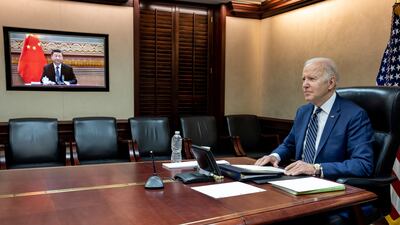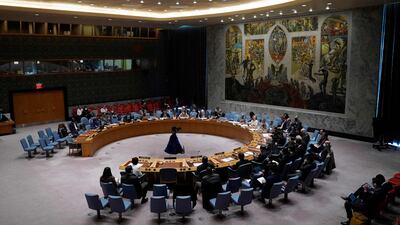Live updates: follow the latest news on Russia-Ukraine
US President Joe Biden on Friday outlined “implications and consequences” to China's President Xi Jinping if Beijing provides material support to Russia as it attacks Ukraine, the White House said.
The two leaders' two-hour video call “focused on Russia’s unprovoked invasion of Ukraine” and Mr Biden “described the implications and consequences if China provides material support to Russia as it conducts brutal attacks against Ukrainian cities and civilians”, the White House said in a readout of the call.
Chinese state media reported that Mr Xi told Mr Biden that the war must end as soon as possible.
“The top priorities now are to continue dialogue and negotiations, avoid civilian casualties, prevent a humanitarian crisis, cease fighting and end the war as soon as possible,” Mr Xi said.
All parties should jointly support Russia-Ukraine dialogue and negotiations while the US and Nato also conduct talks with Moscow to solve the “crux” of the crisis and resolve the security concerns of both countries, he added.
Mr Biden underscored his support for a diplomatic resolution to the crisis, the White House said.
Planning for the meeting had been in the works since Mr Biden and Mr Xi last held a video summit in November, but differences between Washington and Beijing over Russian President Vladimir Putin’s three-week-old war in Ukraine gave the call new focus.
White House Press Secretary Jen Psaki earlier said Mr Biden would question Mr Xi about Beijing’s “rhetorical support” of Mr Putin and an “absence of denunciation” of Russia’s brutal invasion of Ukraine.
“This is an opportunity to assess where President Xi stands,” Ms Psaki said.
Earlier this week, the US informed Asian and European allies that intelligence had determined China had signalled to Russia it would be willing to provide military support for the campaign in Ukraine and financial backing to help stave off the impact of severe sanctions imposed by the West.
“President Biden … will make clear that China will bear responsibility for any actions it takes to support Russia's aggression and we will not hesitate to impose costs,” US Secretary of State Antony Blinken said on Thursday.
China on Friday again sought to highlight its calls for negotiations and donations of humanitarian aid, while accusing the US of provoking Russia and fuelling the conflict by shipping arms to Ukraine.
“China has called for every effort to avoid civilian casualties all the time,” Foreign Ministry representative Zhao Lijian told reporters at a daily briefing.
“Which do the civilians in Ukraine need more: food and sleeping bags or machine guns and artillery? It’s easy to answer.”
The US-China relationship, long fraught, has only become more strained since the start of Mr Biden’s presidency. Mr Biden has repeatedly criticised China for military provocations in East Asia, human rights abuses against ethnic minorities and efforts to squash pro-democracy advocates in Hong Kong.
But the relationship may have reached a new low with the Russian invasion.
In the days after Mr Putin sent Russian forces into Ukraine, Mr Xi’s government tried to distance itself from Russia’s offensive but avoided criticising Moscow.
At other moments, Beijing’s actions have been provocative and have included amplifying unverified Russian claims that Ukraine ran chemical and biological weapons labs with US support.
White House National Security Adviser Jake Sullivan and senior Chinese foreign policy adviser Yang Jiechi met in Rome earlier this week for an intense, seven-hour talk about the Russian invasion and other issues.
Before the Rome talks, Mr Sullivan said Washington wouldn’t allow China or any other country helping Russia work around economy-jarring sanctions enacted by the US and other allies since the February 24 invasion.
Mr Xi and Mr Putin met in early February, weeks before the invasion, with the Russian leader travelling to Beijing for the start of the Winter Olympics. During Mr Putin’s visit, the two leaders issued a 5,000-word statement declaring limitless “friendship”.
Although seen as siding with Russia, China has also reached out to Ukraine, with its ambassador to the country, Fan Xianrong, on Monday quoted as saying: “China is a friendly country for the Ukrainian people. As an ambassador, I can responsibly say that China will forever be a good force for Ukraine, both economically and politically.”
Despite tension in US-China relations, Mr Biden and Mr Xi have sought to keep the leader-to-leader dialogue open and have become familiar with each other through their political rise.
Agencies contributed to this report.































